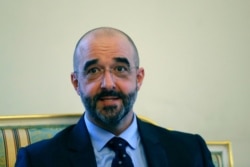Hungary has stifled its independent media and imposed a level of control over journalists that is unprecedented in an EU country, according to a joint report from six international press watchdogs that calls on EU leaders to take action.
The report was compiled ahead of a meeting next week at which EU leaders will discuss punishing Hungary for eroding democratic norms under maverick Prime Minister Viktor Orban.
"The Hungarian government has systematically dismantled media independence, freedom and pluralism, distorted the media market and divided the journalistic community in the country, achieving a degree of media control unprecedented in an EU member state," the report says.
Hungarian government spokesman Zoltan Kovacs rejected the criticisms in a posting on Twitter.
"Fact: TV outlet with largest audience, news portal with largest readership, largest weekly (are) clearly pro-opposition," Kovacs wrote. "But report says: opposition media under constant threat, being muted. What?"
Hungary and Poland's ruling nationalist parties have tightened control over the media, academics, courts and advocacy groups, spurring the European Parliament to launch a so-called Article 7 legal process against both the EU countries.
The European Council, which brings together leaders of EU member states, will hold a hearing with EU affairs ministers on Dec. 10 to discuss the proceedings against both countries.
Fact-finding mission
Ahead of that meeting, the six organizations, which include the International Press Institute (IPI), the Committee to Protect Journalists (CPJ) and Reporters Without Borders (RSF), sent a fact-finding mission to Hungary last month.
"Hungary's situation does not get the attention it should," IPI deputy director and mission leader Scott Griffen told Reuters. "It is important that the EU public and its institutions understand what is going on in Hungary."
The report said some prominent independent outlets remained in Hungary, but their market weight was dwarfed by pro-government publications.
It said Budapest has "a clear strategy to silence the critical press (and operate) a pro-government media empire as a vast propaganda machine."
Critics say that under Orban, state media have become an obedient mouthpiece of his Fidesz party, while the rest of the media landscape is dominated by a conglomerate created by pro-Fidesz businessmen.
Orban's government has denied undermining press freedom.






